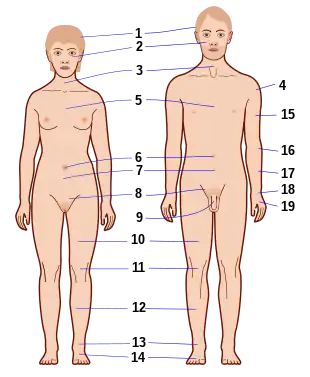Körper
German
| Picture dictionary | |
|---|---|
|
Alternative forms
- Cörper (obsolete)
Etymology
From Middle High German korper, körper, körpel, from Latin corpor-, inflected stem of corpus.
The word displaced first the predecessor of German Leiche, Leichnam (now “corpse”) and later on Leib (now dated, literary, religious). Doublet of Korpus, Korps. The umlaut remained rare until the 16th century. Its derivation from the -i- in Latin corporis, corpori seems unlikely in such a late borrowing. Probably the dissimilated variant körpel received the umlaut by analogy with diminutives in -el. Some Central German dialects show secondary umlaut before -r- + labial (see Hunsrik Kerrper, Kerrver and Luxembourgish Kierper), but precisely these dialects make little or no use of this word. See English corpse for more.
Pronunciation
- IPA(key): /ˈkœrpər/, [ˈkœʁpɐ], [ˈkʰœɐ̯pʰɐ]
Audio (file) - Hyphenation: Kör‧per
Noun
Körper m (strong, genitive Körpers, plural Körper, diminutive Körperchen n)
Declension
Synonyms
- (body of a creature): Leib
Derived terms
- Antikörper
- archimedischer Körper
- Beleuchtungskörper
- Brennkörper
- Feuerwerkskörper
- Flugkörper
- geometrischer Körper
- Heizkörper
- Himmelskörper
- Hohlkörper
- Kleinkörper
- Körpergeruch
- Körpergröße
- Körperhaltung
- körperlich
- Körpermolekül
- körpernah
- Körperschaft
- Körpersprache
- Körperteil
- Körperumfang
- Körperverletzung
- Lehrkörper
- Oberkörper
- platonischer Körper
- regulärer Körper
- Schiffskörper
- Zahlenkörper
Further reading
- “Körper” in Digitales Wörterbuch der deutschen Sprache
- “Körper” in Duden online
- “Körper” in Deutsches Wörterbuch von Jacob und Wilhelm Grimm, 16 vols., Leipzig 1854–1961.
